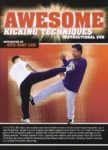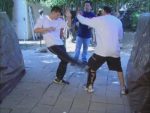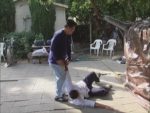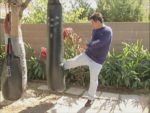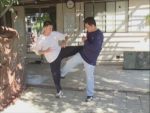“Awesome Kicking Techniques” is the second of sifu Lam’s Wing Chun kicking DVDs. Essentially, this DVD is a DVD that uses various exercises, equipment and drills, both alone and with partner, to enhance and train Wing Chun kicking. In that respect this DVD is quite different from Sifu Lam’s other Wing Chun kicking DVD, “Wing Chun Kicking 1.” It should be stated that this is an advanced level Wing Chun DVD and not for the beginning Wing Chun student.
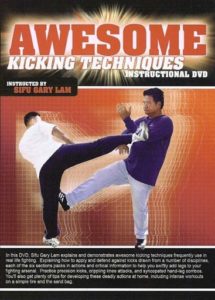 Sifu Lam brings a wealth of experience in training fighters, his own combat experience as well as the wealth of knowledge sifu Lam gained from the late, legendary Wong Shun Leung. There are of course many methods of training the legs for the decidedly different kicking techniques of the Wing Chun system. Some of the exercised and workouts with equipment seen on the DVD seem to bear little relation or resemblance to Wing Chun kicking, but the point is to utilize exercises that help to focus effectively on the kicking techniques within the Wing Chun system. It is by the practice of these exercises that control, power, speed, timing and coordination of hands as well as the body that Wing Chun kicking becomes effective and highly applicable.
Sifu Lam brings a wealth of experience in training fighters, his own combat experience as well as the wealth of knowledge sifu Lam gained from the late, legendary Wong Shun Leung. There are of course many methods of training the legs for the decidedly different kicking techniques of the Wing Chun system. Some of the exercised and workouts with equipment seen on the DVD seem to bear little relation or resemblance to Wing Chun kicking, but the point is to utilize exercises that help to focus effectively on the kicking techniques within the Wing Chun system. It is by the practice of these exercises that control, power, speed, timing and coordination of hands as well as the body that Wing Chun kicking becomes effective and highly applicable.
“Awesome Kicking Techniques” runs at approximately 45 minutes and is divided into six chapters. In each chapter Sifu Lam begins with the specific exercise. Once sifu Lam has explained the specifics of the training exercises, sifu Lam then moves on to demonstrations with a partner and then drills the various content of the specific chapter. Kicking within the Wing Chun system is always coordinated with the body rather than as a solitary technique. Within the Wing Chun system a kick can become a step and a step can become a kick and a kick can become multiple kicks as demonstrated in various chapters of the DVD. These characteristics make Wing Chun kicking decidedly effective.
In the first section of the DVD sifu Lam uses what he calls “four corner” training on an automobile tire. The term “four corner” refers to the use of the inner step of the foot, the outer step of the foot, the ball of the foot, and finally the back heel of the foot. The four corner training is applied to a rubber tire that slides across a smooth cement surface. Sifu Lam does state that careful attention should be given to the stance of the body lest the kicking degenerate in both power and structure. Kicking the tire properly, without leaning forward, helps to generate power, shift direction of an incoming force and of course provides tactile feedback.
These “four corner” techniques can easily be applied in fighting with some spectacular results as shown in the second chapter of the DVD. For each of the four corner kicking techniques, proper timing has to be applied. Four corner kicking as a method of control is ably demonstrated by sifu Lam against his student Peter Hsu. By use of one of the four-corner kicking techniques the Wing Chun fighter controls the opponent, by stopping, redirecting or breaking a technique. Wing Chun does not use force to counter force in either hand or leg techniques.
The next chapter uses hanging punching bags as part of the training equipment. While the techniques demonstrated seem to resemble Muy Thai, sifu Lam is quick to point out the training techniques are not Muy Thai. Hand-leg cooperation, stance, follow through are all important points that sifu Lam stresses in this leg/kick training section. Sifu Lam also covers three distances long, short and shorter for kicking/kneeing. Wing Chun kicking does not use wasted motion; economy of technique is always present. Sifu Lam points this out repeatedly. Five types of kicks and five types of punching techniques or “actions” are demonstrated, which make for ten actions over all.
The subsequent chapter takes the techniques or “actions” as sifu Lam labels them, from the bag training and applies these to training with a partner. Not every technique from the previous chapter is covered. One very good example of relaxing within Wing Chun, using the second action utilizes a high kick by the opponent which is defended by a very relaxed arm followed by a kick to the lower part of the leg at the knee by the Wing Chun fighter. This is a very effective use of Wing Chun relaxation. Sifu Lam does state that the kick by the opponent absorbed by the relaxed arm will “not feel good,” but the pain felt is certainly less than had the force of the kick been taken to the head.
The penultimate chapter of the DVD shows eight distinct Wing Chun kicking actions that can be used in tournament fighting or street fighting. At this point in history many forms of martial arts are currently practiced and the point of this chapter is to deal with those various martial arts by deliberate and effective training of Wing Chun kicks. In this chapter sifu Lam uses two students to demonstrate each of the kicks. Because over time great power is developed, protective gear should be worn to prevent injury to the partner of the kicker and control is quite necessary. Wing Chun kicks, as demonstrated in this section of the DVD are powerful, fast and very controlling.
The final chapter deals with crossing hands and kicking. Initially, sifu Lam demonstrates purely hand techniques against an attack. Sifu Lam progresses by showing the hand techniques slowly and then accelerates the pace to show the true speed of Wing Chun hands. However, to fully utilize the Wing Chun system Sifu Lam adds the kicking techniques developed in the previous sections to show the full extent of the power of Wing Chun kicking within fighting. Again, the results of using both and kicking can be quite spectacular.
This DVD is a compliment to the other DVD, “Wing Chun Kicking 1” in sifu Lam’s Wing Chun DVD series. The DVD concentrates on both training the legs with equipment and then with a partner. Each of the chapters is sequenced to explain and illustration the effectiveness of Wing Chun kicks, which most likely few will use in actual combat. However, since Wing Chun is a complete system, Wing Chun kicks are fully developed and add a substantial and powerful asset to the Wing Chun practitioner’s arsenal when fighting.
Again “Awesome Kicking Techniques” is geared towards the advanced Wing Chun practitioner and is there for considered an advanced Wing Chun topic DVD. The DVD is highly recommended for those wishing to improve their Wing Chun kicking regardless of their lineage. Sifu Gary Lam follows and teaches the Wong Shun Leung Wing Chun system, which is an offshoot of Yip Man Wing Chun.
The Wong Shun Leung Wing Chun system was developed by the late, famed Wong Shun Leung as he gained experience in his numerous challenge matches (Biemo). Wong Shun Leung emerged from these numerous challenge matches in the streets of Hong Kong undefeated and was known as “King of Talking with the Hands.” For those interested in reading more about Wong Shun Leung and his challenge fights the book “Look Beyond the Pointing Finger: the Combat philosophy of Wong Shun Leung” by Sifu David Peterson is a highly recommended and is now in its second edition.
Review by: Manuel Bustos
Purchased at: Awesome Kicking at EWC!

